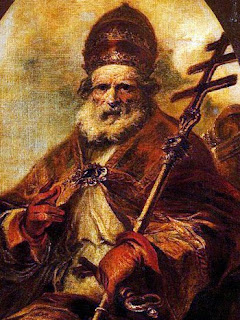Both are essential if Jesus is to be the Savior of the world. He must be true man if he is to be our true substitute in life and in death. As true man, Jesus fulfills the Commandments. So, a man has earned God's favor. As true man, Jesus dies. And in Jesus, a man has conquered the grave, overcome death, and opened up heaven to all mankind.
And yet, as the Psalms remind us, "Truly no man can ransom another or give to God the price of his life." (Psalm 49:7) So, if Jesus is only a man, he earned his spot in heaven. Good for him; but he would have done nothing for you or me. Therefore, he has to be God in order for his perfect life and sacrificial death to count for all.
This is not a Lutheran teaching, as if Lutherans invented this teaching. This is the teaching of the Christian church, the church catholic--with which Lutherans concur. We are declaring only what the Scriptures declare. In teaching and confessing this, we find comfort that Jesus is the very Savior we need, and that his work of redemption guarantees our place in God's kingdom.
 |
| Pope Leo the Great |
"So the proper character of both natures was maintained and came together in a single person. Lowliness was taken up by majesty, weakness by strength, mortality by eternity. To pay off the debt of our state, invulnerable nature was united to a nature that could suffer; so that in a way that corresponded to the remedies we needed, one and the same mediator between God and humanity the man Christ Jesus, could both on the one hand die and on the other be incapable of death. Thus was true God born in the undiminished and perfect nature of a true man, complete in what is his and complete in what is ours. By “ours” we mean what the Creator established in us from the beginning and what he took upon himself to restore. There was in the Saviour no trace of the things which the Deceiver brought upon us, and to which deceived humanity gave admittance. His subjection to human weaknesses in common with us did not mean that he shared our sins. He took on the form of a servant without the defilement of sin, thereby enhancing the human and not diminishing the divine. For that self-emptying whereby the Invisible rendered himself visible, and the Creator and Lord of all things chose to join the ranks of mortals, spelled no failure of power: it was an act of merciful favour. So the one who retained the form of God when he made humanity, was made man in the form of a servant. Each nature kept its proper character without loss; and just as the form of God does not take away the form of a servant, so the form of a servant does not detract from the form of God."
Sourece: http://www.papalencyclicals.net/councils/ecum04.htm

No comments:
Post a Comment
Due to recurring spam, all comments will now be moderated. Please be patient.